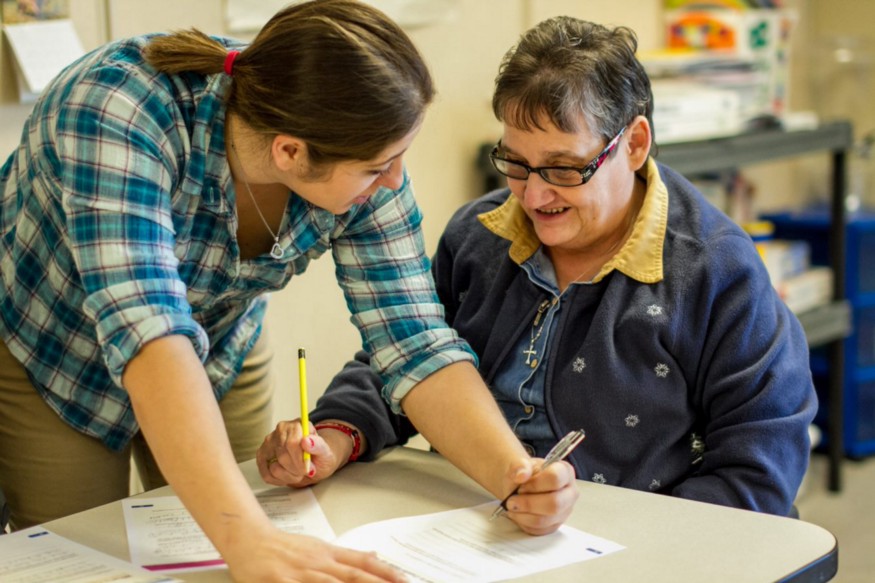Stuck in the Middle: Community-Based Disability Service Providers Face Impossible Choices Amid Reopening
Share this pageThis article initially appeared on ANCOR’s Medium page; read and share it there.
In recent weeks, news coverage of the COVID-19 pandemic has been laser-focused on school reopening, and administrators at both the K-12 and postsecondary levels face impossible choices. Should schools fully reopen and risk further transmission of the virus? Remain closed and risk further harm to students’ education? Something in between?
Just as schools grapple with these questions, so too are community-based providers of disability services confronted with their own impossible choices. In residential programs, where people with intellectual and developmental disabilities (I/DD) are supported in their homes, should people have unfettered access to the community? Should friends and family be permitted to visit them? What about day programs, which support people to work, volunteer and otherwise be engaged in the community? When and how should they reopen?
Because these programs are largely funded by Medicaid, which is a partnership between the federal and state governments, day program closures and residential program restrictions in place since March have varied widely by state. But across the board, one thing has been true: community providers have been remarkably effective at keeping people safe from COVID-19, despite a host of seemingly impossible challenges. Despite plummeting revenue, inadequate PPE, significant staff shortages and more, swift action by community providers has helped the I/DD community avoid the tragic fates that have haunted nursing homes and other long-term care facilities.
But lockdown can’t last forever, and six months into the pandemic, providers are struggling to walk the razor’s edge between maintaining restrictions that keep people safe (albeit at the expense of their access to the community) and reopening programs (albeit at the risk of spreading the coronavirus).
We represent ANCOR, the nation’s leading association of private providers of disability services. Founded in 1970, ANCOR has always been focused on people’s rights and their ability to experience life in the community. Our purpose for the past 50 years has been to shift focus away from people’s disabilities and toward providing the environment and supports essential to discovering people’s abilities.
Like schools, there is no one-size-fits-all answer to the questions regarding when, how and under which circumstances our services should reopen. But state Medicaid programs can offer three key ingredients to ensure our reopening isn’t a recipe for disaster: guidance, flexibility and financial resources.
Absent these ingredients, providers are left to make choices about reopening on their own — choices we know they will make with the best interests of the people they support front of mind. But they must tread carefully, striking a delicate balance between safety and civil rights. We know that staying home is still the most effective way for all of us to stop the spread of COVID-19. At the same time, we know day programs — which by definition require venturing outside the home — often provide invaluable opportunities for people with I/DD to connect with the community, engage with their peers, build skills, find work and more.
While states can be essential partners in the process of making decisions about reopening, so too does the federal government have an important role to play. Because the patchwork quilt of regulations already in place varies as widely as the structure of states’ Medicaid programs, Congress and the Trump administration should direct the Centers for Medicare and Medicaid services (CMS) to encourage states to issue clear guidance, expand the duration of existing regulatory flexibilities, and ensure resources are available to providers in the form of expanded retainer payments so they stay in business long enough to help people thrive well beyond the lifespan of this pandemic.
Such guidance, flexibility and resources would help mediate the vast array of fears and feelings of frustration — of loss of autonomy. It would also go a long way in acknowledging the realities incumbent with people living together who may have different beliefs about how to strike the delicate balance between safety and civil rights. And, it would be a significant acknowledgment of the obligation of providers to ensure the safety of all, even when doing so feels too restrictive.
Barbara Merrill is CEO of ANCOR, the American Network of Community Options & Resources. Robert Budd is President of the ANCOR Board of Directors and CEO of Family Residences & Essential Enterprises, Inc., a disability service provider based in Old Bethpage, N.Y.

